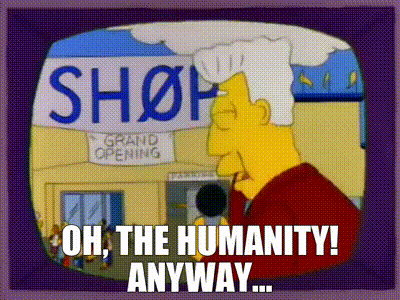This post may turn out a bit different than the others in my blog, but I want to talk about something that really struck me last week.
As you may already know, Canadian e-commerce platform and tech giant Shopify decided to lay off about 10% of its workforce last Tuesday, which means about 1000 employees were shown the door overnight.
While obviously I wasn’t affected personally by such decision, it really gave me the creeps. People working in recruitment, sales, and even localization found themselves without a job because of a bet gone wrong.
Yes, a BET.
To make a long story short, the online company’s CEO Tobi Lütke placed a bet during the pandemic that the growth in online sales would leap ahead by the following 5 or even 10 years, and if that was true, the company would have to expand accordingly.
Clearly, the assumption didn’t pay off.
Now, I’m no market analyst nor I want to take their place, but it looks pretty obvious to me that such surge in online shopping was dictated by the need to actually buy something, given that traditional brick-and-mortar shops were closed or sometimes out of reach. But since humans are social animals, and COVID-19 limitations were actually affecting our ability to socialize, I’ve always been sure that online markets wouldn’t or even couldn’t replace physical shops 100%. As Neil Saunders, managing director of GlobalData, put it, “…this was a huge strategic mistake that was driven by an insufficient understanding of customer behaviour, a lack of rigour in analyzing the market, and a bit of hubris.” (source: cp24.com)
Again, this was the result of a poor market strategy. Yet, those who suffered the consequences were employees, not employers. Isn’t it ridiculous that some people have actually the power to play with other people’s lives? I believe that if you are to be laid off, it should be because you don’t add value to the company, not because of poor and rushed choices taken by others.
It is rather simple to downsize… it looks like the simpler and more effective method to limit costs. But I think it has consequences in the long term. Some of the employees who were fired were decisive in the pre-pandemic surge of the company – and now all of their knowledge and experience is gone. The remaining workforce should now deal with new and increased workloads, which are likely not included in their traditional tasks. Not to mention the fact that they probably have little time to learn and master them – which could ultimately result in frustration towards the management.
Being freelance since forever, I was lucky enough to never deal with such behavior. But unfortunately I have witnessed it to the expenses of friends and family. How many times have you seen valuable employees being exploited or even fired by bossy bosses? And sometimes it seems that the bigger the firm, the worst their behavior… which probably means they only take into account their needs and vision, rather than those of the company as a whole.
Yet, I saw something I really appreciated. As soon as the news had come out, a huge network of professionals on LinkedIn mobilized to help some of the former Shopify employees. It all started from colleagues and acquaintances who posted really heartfelt calls to hire this powerful workforce, and it resulted in thousands of likes and shares by people who didn’t even know them. I bet those posts worked better than references, and that some of the workers have already found another job…
How powerful could a social network like LinkedIn be? TBH, I didn’t like it at first – to me, it looked like a showcase for successes and preaching which could likely demotivate or overshadow poor freelancers like me! But I found it could hide a human side which goes well beyond help and support. It involves respect, appreciation, engagement and a sense of dignity. Something that could really affect other people’s lives… in a positive way. If I were one of those Shopify employee, my heart would have melted in front of this mobilization.
This is a beautiful example of how socials can be used positively and for a precise goal. After all, we all are social animals by nature, aren’t we?
